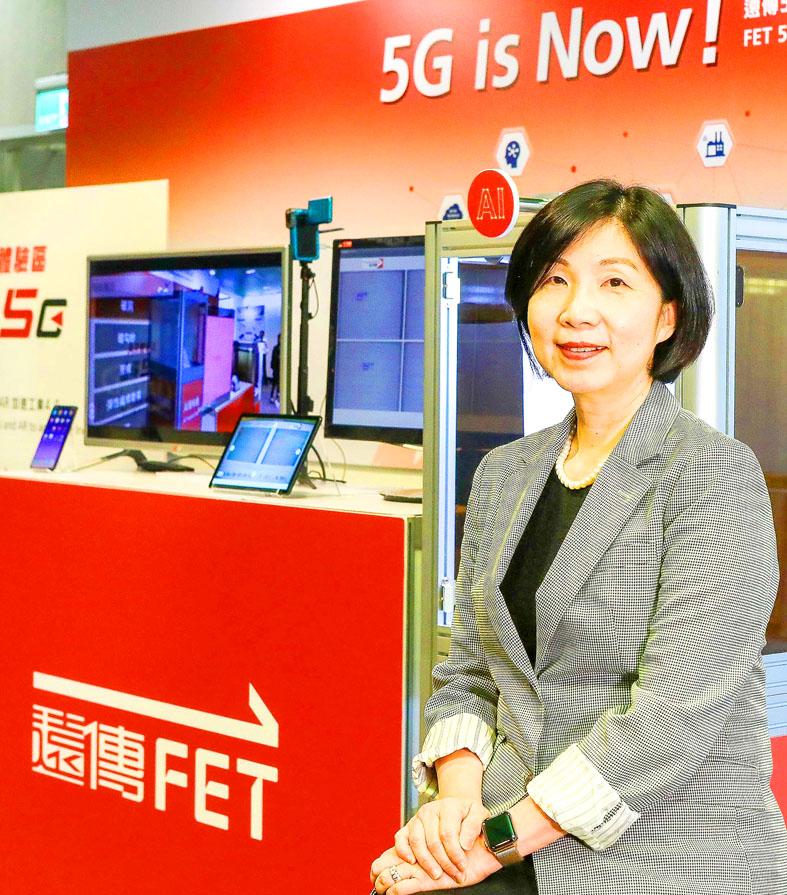Far EasTone Telecommunications Co (遠傳電信) expects a proposed merger with Asia Pacific Telecom Co (APT, 亞太電信) to add at least NT$3 billion (US$107 million) in earnings before interest, taxes, depreciation and amortization (EBITDA) in the first year of combination, mostly from savings in operating expenses regarding network deployment and operation.
Far EasTone on Friday unveiled its plan to acquire APT via a share-swap deal valued at about NT$24.7 billion.
The company plans to issue 356.7 million new shares for APT shareholders, it said.

Photo: Wang Yi-hung, Taipei Times
“This [NT$3 billion] is a rather conservative estimate,” Far EasTone president Chee Ching (井琪) told an online investors’ conference yesterday. “I will be comfortable with NT$3 billion synergy contribution in the first year. Any upsides will be just bonuses.”
As both companies use Ericsson AB equipment and technology, about 90 percent of APT’s base stations can directly join Far EasTone’s network upon approval of the merger by local regulators, Ching said.
Two telecoms integrating into one would prevent overlapping investments, she said.
Far EasTone also expects synergy from combined capacity in the 28 gigahertz (GHz) frequency band, as the two telecoms together have 800 megahertz in 5G capacity.
The company is exploring new business opportunities to provide low-Earth-orbit (LEO) Internet services in collaboration with satellite companies like StarLink, Ching said.
The company also plans to use the 28GHz bandwidth for enterprise clients to build private networks, she said.
Far EasTone expects EBITDA to expand 8.1 percent to NT$30.45 billion this year from NT$28.17 billion last year.
The company said mobile telecom services and “new economy,” including cloud-based and digital services, are growth engines.
The forecast does not factor in synergies from the planned merger.
“We will continue to grow the telecom business, which is different from the past few years when telecom [services] had been declining,” Ching said. “Now we are seeing ... demand and growth momentum from telecom as well.”
Net income is expected to grow 1.1 percent to NT$9.22 billion this year from NT$9.12 billion last year, Far EasTone said.
That would translate into earnings of NT$2.83 per share, up from NT$2.8 last year.
Revenue is expected to rise 4.1 percent to NT$88.79 billion this year from NT$85.32 billion last year.
Capital expenditures this year are expected to fall about 8 percent to NT$11.1 billion from NT$12.1 billion last year.
The company has proposed to distribute a cash dividend of NT$3.25 per share, the same as last year and 2020.
The proposal is subject to shareholders’ approval during the annual general meeting in June, the company said.

Hon Hai Precision Industry Co (鴻海精密) yesterday said that its research institute has launched its first advanced artificial intelligence (AI) large language model (LLM) using traditional Chinese, with technology assistance from Nvidia Corp. Hon Hai, also known as Foxconn Technology Group (富士康科技集團), said the LLM, FoxBrain, is expected to improve its data analysis capabilities for smart manufacturing, and electric vehicle and smart city development. An LLM is a type of AI trained on vast amounts of text data and uses deep learning techniques, particularly neural networks, to process and generate language. They are essential for building and improving AI-powered servers. Nvidia provided assistance

DOMESTIC SUPPLY: The probe comes as Donald Trump has called for the repeal of the US$52.7 billion CHIPS and Science Act, which the US Congress passed in 2022 The Office of the US Trade Representative is to hold a hearing tomorrow into older Chinese-made “legacy” semiconductors that could heap more US tariffs on chips from China that power everyday goods from cars to washing machines to telecoms equipment. The probe, which began during former US president Joe Biden’s tenure in December last year, aims to protect US and other semiconductor producers from China’s massive state-driven buildup of domestic chip supply. A 50 percent US tariff on Chinese semiconductors began on Jan. 1. Legacy chips use older manufacturing processes introduced more than a decade ago and are often far simpler than

STILL HOPEFUL: Delayed payment of NT$5.35 billion from an Indian server client sent its earnings plunging last year, but the firm expects a gradual pickup ahead Asustek Computer Inc (華碩), the world’s No. 5 PC vendor, yesterday reported an 87 percent slump in net profit for last year, dragged by a massive overdue payment from an Indian cloud service provider. The Indian customer has delayed payment totaling NT$5.35 billion (US$162.7 million), Asustek chief financial officer Nick Wu (吳長榮) told an online earnings conference. Asustek shipped servers to India between April and June last year. The customer told Asustek that it is launching multiple fundraising projects and expected to repay the debt in the short term, Wu said. The Indian customer accounted for less than 10 percent to Asustek’s

Gasoline and diesel prices this week are to decrease NT$0.5 and NT$1 per liter respectively as international crude prices continued to fall last week, CPC Corp, Taiwan (CPC, 台灣中油) and Formosa Petrochemical Corp (台塑石化) said yesterday. Effective today, gasoline prices at CPC and Formosa stations are to decrease to NT$29.2, NT$30.7 and NT$32.7 per liter for 92, 95 and 98-octane unleaded gasoline respectively, while premium diesel is to cost NT$27.9 per liter at CPC stations and NT$27.7 at Formosa pumps, the companies said in separate statements. Global crude oil prices dropped last week after the eight OPEC+ members said they would